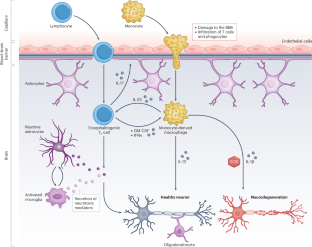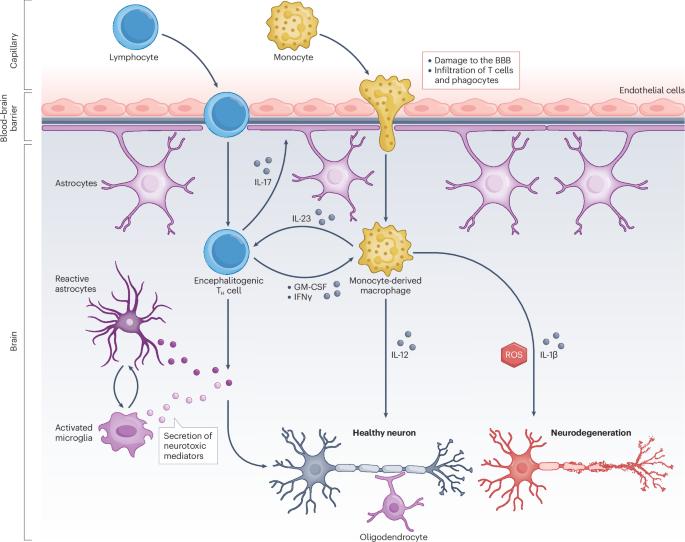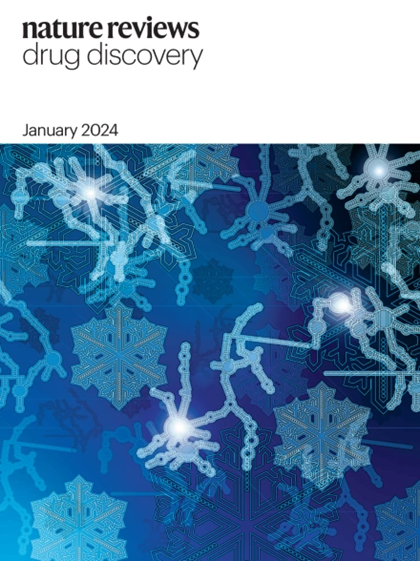Targeting cytokine networks in neuroinflammatory diseases
IF 101.8
1区 医学
Q1 BIOTECHNOLOGY & APPLIED MICROBIOLOGY
引用次数: 0
Abstract
In neuroinflammatory diseases, systemic (blood-borne) leukocytes invade the central nervous system (CNS) and lead to tissue damage. A causal relationship between neuroinflammatory diseases and dysregulated cytokine networks is well established across several preclinical models. Cytokine dysregulation is also observed as an inadvertent effect of cancer immunotherapy, where it often leads to neuroinflammation. Neuroinflammatory diseases can be separated into those in which a pathogen is at the centre of the immune response and those of largely unknown aetiology. Here, we discuss the pathophysiology, cytokine networks and therapeutic landscape of ‘sterile’ neuroinflammatory diseases such as multiple sclerosis (MS), neuromyelitis optica spectrum disorder (NMOSD), neurosarcoidosis and immune effector cell-associated neurotoxicity syndrome (ICANS) triggered by cancer immunotherapy. Despite successes in targeting cytokine networks in preclinical models of neuroinflammation, the clinical translation of targeting cytokines and their receptors has shown mixed and often paradoxical responses. Dysregulated cytokine networks are important in the pathogenesis of neuroinflammation. This Review discusses targeting cytokines and their receptors in non-infectious central nervous system inflammatory diseases such as multiple sclerosis and neurosarcoidosis, as well as in the neurotoxic adverse events that can be triggered by cancer immunotherapy.


针对神经炎性疾病中的细胞因子网络
在神经炎症性疾病中,全身(血液)白细胞侵入中枢神经系统(CNS)并导致组织损伤。神经炎症性疾病与细胞因子网络失调之间的因果关系已在多个临床前模型中得到证实。细胞因子失调也是癌症免疫疗法的一个意外效应,它往往会导致神经炎症。神经炎症性疾病可分为以病原体为免疫反应中心的疾病和病因不明的疾病。在这里,我们将讨论 "无菌性 "神经炎症疾病的病理生理学、细胞因子网络和治疗方法,如多发性硬化症(MS)、神经脊髓炎视网膜频谱障碍(NMOSD)、神经肉芽肿病和癌症免疫疗法引发的免疫效应细胞相关神经毒性综合征(ICANS)。尽管在神经炎症的临床前模型中靶向细胞因子网络取得了成功,但靶向细胞因子及其受体的临床转化却显示出好坏参半且经常出现矛盾的反应。
本文章由计算机程序翻译,如有差异,请以英文原文为准。
求助全文
约1分钟内获得全文
求助全文
来源期刊

Nature Reviews. Drug Discovery
医学-生物工程与应用微生物
CiteScore
137.40
自引率
0.30%
发文量
227
期刊介绍:
Nature Reviews Drug Discovery is a monthly journal aimed at everyone working in the drug discovery and development arena.
Each issue includes:
Highest-quality reviews and perspectives covering a broad scope.
News stories investigating the hottest topics in drug discovery.
Timely summaries of key primary research papers.
Concise updates on the latest advances in areas such as new drug approvals, patent law, and emerging industry trends and strategies.
 求助内容:
求助内容: 应助结果提醒方式:
应助结果提醒方式:


